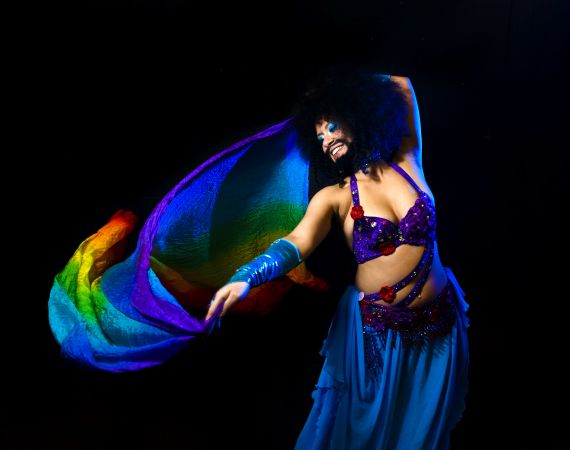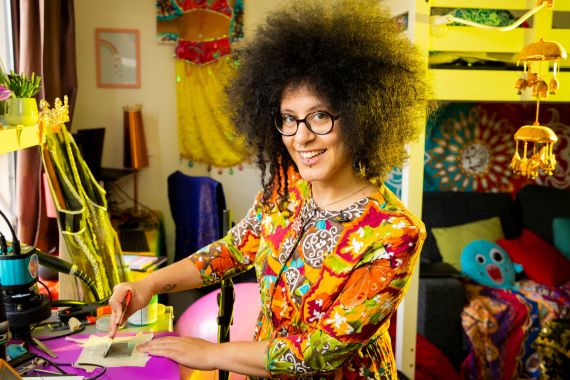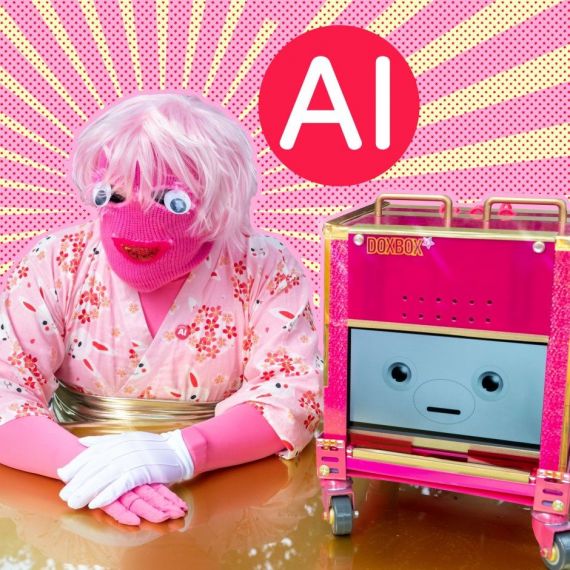Article
Posted on Mon 17 Jan 2022
Introducing our Winter Residency Artists 2022
Following our Winter Residencies programme open call, we’re excited to introduce the two artists who will develop incredible ideas that blend culture and creative technologies - from a flying saucer to a belly dancing robot.

Shrouk El-Attar by Diego Maeso
Watershed’s annual Winter Residencies programme is an opportunity for artists to develop cutting edge ideas at the Pervasive Media Studio, Watershed’s creative technologies research space. This year's artists cast a light on lost futures, lost stories and the splendour of the unexpected.
Say hello to the Residents:
First up is Shrouk El-Attar an artist, engineer and LGBT refugee from Egypt. Shrouk is primarily a belly dancer and drag performer who undertakes refugee work through their art and raises awareness of LGBT+ issues in Egypt. Shrouk is currently developing a new show which includes a duet with a belly dancing robot. They intend to smash their engineering and art skills together, to explore making a robot that moves autonomously to Egyptian music.

Shrouk El-Attar by Diego Maeso
Shrouk says:
"As an Egyptian, I grew up with bellydance being simply called “dance”. The term “bellydance” is a Western-coined name that isn’t even descriptive of the authentic practice - we don’t use our bellies to dance and the original Egyptian costume even covered the stomach and the arms. On Google, nearly everybody who turns up in image search is white, western, and looks nothing like me. It often feels like I have been literally wiped out of my own culture. I want to create a bellydancing robot that autonomously dances to Egyptian music so that every interaction is completely unique, for it to be something that brings joy but also starts important conversations. By making my robot appear gender non-confirming, It pays homage to the Egyptian Ghawazee of the 1800s and reminds people that Egyptian dance wasn’t originally something that women performed for men’s entertainment, but everyone of all genders takes part in for others of all genders and, most importantly, for their own personal joy.
"It is also a way for me to finally bring my whole self to the stage. As an engineer and a performer, I often see those two things divided into two separate worlds. I want people to see how powerful it is when both art and engineering are combined, for the engineering community to realise the importance of creativity in engineering, and the creative community to understand that they absolutely belong in engineering too! I want to teach how to make your very own bellydancing robot to my queer refugee community and to people who never thought of themselves as capable of building such things, to show them that not only they can, but that their art and creativity makes it even better!"
Our second recipient is Alistair Gentry who makes live art, performance lectures, interventions, installations and live role-playing games. Alistair’s playful project will investigate British Rail’s patent filing for a flying saucer and explore the possibility of bringing this vivid example of British utopianism to life as an accessible AR/VR experience.

Alistair Gentry in DoxBox Trustbot (2018-2021). Commissioned by The Open Data Institute's Data as Culture programme and funded by Innovate UK. Photo by Andrea Capello, design by Alistair Gentry.
Alistair says:
"In 1973, the year I was born, British Rail filed a patent for a flying saucer. A lot of my work is about historical figures or movements that have been obscured by the passage of time, or alternate histories that could have been if circumstances had been different, like the UK’s nationalised railway company making new roads, vehicle pollution, energy scarcity and private transport obsolete by 2022. This is more in line with how I imagined the 2020s would be when I was a child, instead of the rampant neo-liberal, punitive austerity, nationalise-risk-and-privatise-profit narratives that continue to dominate our culture and our country. My ambition to manifest this lost future for the first time is complicated by the fact that for disability reasons I can’t fully experience many digital projects- especially VR/AR- so I’m also really excited to research visual technologies at the Pervasive Media Studio that bring this idea to life in ways that are more accessible to more people."
Victoria Tillotson, Watershed’s Talent Development Lead, says:
"We are tremendously excited to support Alistair and Shrouk through Watershed’s Winter Residency programme. Their ideas are timely and important, investigating human relationships, future building, cultural appropriation, power balances and political systems on a local and international scale. We cannot wait to get stuck into supporting them with all the challenges and wonderful surprises that will inevitably unfold!"
Both residencies will run between January – March 2022. The artists will receive financial, critical and technical support from Watershed and will share their progress via blogs and conversations on the Pervasive Media Studio website. We’re also planning to host a free public showcase event pencilled in for Friday 25 March 2022 - more details coming very soon.
Winter Residencies 2022 is made possible with support from Arts Council England